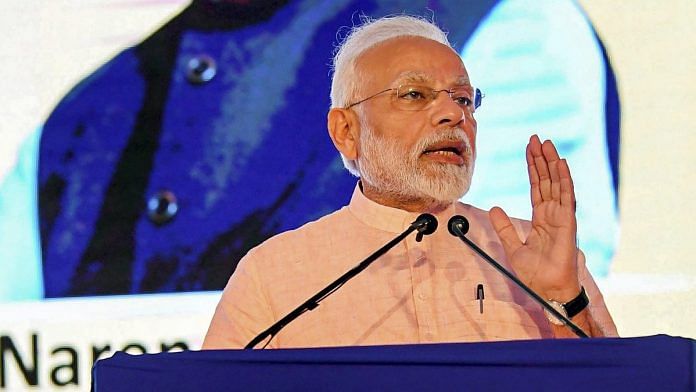But in all probability, Prime Minister Narendra Modi will pack in several big-ticket, populist announcements before the election campaign formally begins.
On Feb. 1 in India, Prime Minister Narendra Modi’s government will present its last federal budget before general elections are held in a few months. Unlike most other budgets, this typically isn’t a high-octane affair; governments are discouraged from locking their successors into any new spending or taxes. An “interim” budget, as it’s called, tries to avoid committing spending for the entire financial year, which begins from April.
But, Modi’s finance minister seems ready to break with that requirement. Politicians from India’s ruling Bharatiya Janata Party insist that there’s no legal requirement to present just a vote-on-account. And the reason’s obvious: They want to pack in as many big-ticket, populist announcements as they can before the election campaign formally begins and governments are forbidden to make new promises outside party manifestos.
While Modi doesn’t exactly have his back against the wall in his re-election campaign, he won’t be feeling entirely comfortable either. A round of state elections towards the end of last year saw the BJP lose control of three crucial North Indian states — in the very region that propelled him to his landslide victory in the last parliamentary elections in 2014.
The truth is that Modi doesn’t have very many seats to lose. His majority in the lower house of Parliament is both unprecedented by Indian standards and, nevertheless, razor thin. He won 282 seats out of 543 in 2014, and has lost several in by-elections since. A dip in the prime minister’s popularity doesn’t need to be significant for him to lose his majority. And if he has to try and craft a coalition, he may wind up being vulnerable to leadership challenges from within his party.
That’s why these last few weeks before the full-blown campaign begins are crucial. Modi will want to use that time to win over those sections of the Indian electorate that are the most disappointed with his underwhelming record — small business owners, the salaried middle class and farmers.
Also read: Expect Piyush Goyal to make big announcements on farm, retail & exports in Budget
Small business owners have traditionally been the backbone of the BJP, as they are of its ideological parent, the Rashtriya Swayamsevak Sangh. But, Modi’s decision in 2016 to withdraw all of India’s high-value currency notes from circulation overnight hit such businesses — which, in India, often rely on working capital in cash — particularly hard. Worse, the government’s switch to a new indirect tax system, the goods and services tax or GST, was very badly planned and implemented. As a result, businesses that were already reeling from demonetization saw their compliance costs increase sharply.
There’s a tangible sense of betrayal in the air: The BJP is a small businessman’s party, the argument goes, yet its government has signally failed to understand how small business works. The government’s already said it will exempt businesses with an annual turnover of up to Rs. 4 million (just under $60,000) from the tax. Other such announcements, including about cheaper credit, are likely to be made in the budget.
India’s relatively small — but politically influential — middle class has always been something of a swing vote. Their shift from former Prime Minister Manmohan Singh’s Congress Party to Modi’s BJP in the years prior to 2014 was crucial to the current prime minister’s victory. While Modi remains by far their most popular politician, there’s far less enthusiasm this time around, and an all-pervasive sense that the government doesn’t share the middle class’s concerns. That’s why most people are convinced that some form of income-tax cut will be announced in the budget.
Finally, Modi has become somewhat unpopular with many of the large swathe of Indians who depend upon farming for their incomes. Agricultural prices — and thus incomes — haven’t risen as quickly as under the previous government, and the currency ban hit the agricultural trade hard as well. Modi’s government says it believes that spending in rural areas should go into creating infrastructure, such as irrigation systems and highways. This is a wise priority, but the effort hasn’t been sufficient in scale or efficient in nature — and, as a result, hasn’t had enough of an impact on incomes. Pressure is growing to try direct transfers to farmers, or to ensure that they get even more access to credit at concessional rates.
Also read: The hits and misses of Arun Jaitley’s Budgets
Populist spending is to be expected in an election year. But, the simple fact is that Modi has left it till too late. At this stage of the game, few voters are likely to see any promised spending in a budget as any more solid than the easy promises made in election manifestos or from the stage at an election rally. Modi and his officials should realize that that’s where such promises belong — and not in an interim budget. All prime ministers before him have respected the tradition of treating the last budget before elections as just a way to keep the government going for a few months. Modi should too.-Bloomberg




We don’t need anybody from the Gandhi Khan clan who have looted Hindustan and are incompetent and immature lady from the woods whose husband Vadra too has looted the poor and become a crorepati in a decade from 2002 to 2012 and acting as an innocent.
Difficult to judge how much electoral good this last minute splurge will do but the fisc will certainly be weakened further. A lot on the next FM to wrestle with.
Shameless socialist Modi budget-freebies subsidies reservation loan waivers. No monies for defence and development.